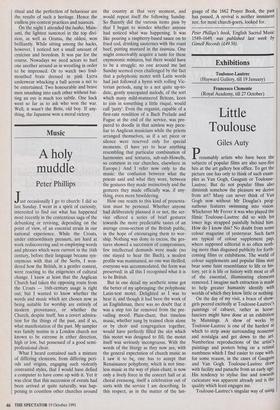Music
A holy muddle
Peter Phillips
Just occasionally I go to church: I did so last Sunday. I went in a spirit of curiosity, interested to find out what has happened most recently in the contentious saga of the debunking or reviving, depending on the point of view, of an essential strain in our national experience. While the Croats, under extraordinary pressure, are hard at work rediscovering and re-employing words and phrases which were current in the 16th century, before their language became syn- onymous with that of the Serbs, I won- dered how the British, in a gentler context, were reacting to the exigencies of cultural change. I knew at least that the Anglican Church had taken the opposing route from the Croats — 16th-century usage is right out; but I wanted to know whether the words and music which are chosen now as being suitable for worship are entirely of modern provenance, or whether the Church, despite itself, has a covert admira- tion for the things of the past, and if so, what manifestation of the past. My sampler was family matins in a London church not known to be extreme in either direction, high or low, but possessed of a good semi- professional choir.
What I heard contained such a mixture of differing elements, from differing peri- ods and origins, engaging such violently contrasted styles, that I would have defied a computer to have come up with it. Yet it was clear that this succession of events had been arrived at quite naturally, was hap- pening in countless other churches around
the country at that very moment, and would repeat itself the following Sunday. So fluently did the various items pass by that I began to wonder whether anyone had noticed what was happening. It was like pouring a raspberry-based sauce on to fried cod, drinking sauternes with the roast beef, putting mustard in the tiramisu. One might conceivably acquire a taste for these oxymoronic mixtures, but there would have to be a struggle; no one around me last Sunday seemed even challenged by the fact that a polyphonic motet with Latin words had just followed a hymn with rolling Vic- torian periods, sung to a not quite up-to- date, gently syncopated melody, of the sort which many mild-mannered Britons, keen to join in something a little risque, would call 'jazzy'. Even the organist, capable of a first-rate rendition of a Bach Prelude and Fugue at the end of the service, was pre- pared to doodle in that aimless way pecu- liar to Anglican musicians while the priests arranged themselves, as if a set piece or silence were reserved only for special moments. (I have yet to hear anything resembling that particular combination of harmonies and textures, sub-sub-Howells, so common in our churches, elsewhere in Europe.) And I refer now only to the music: the confusion between what the priests said and what they wore, between the gestures they made instinctively and the gestures they made officially was, if any- thing, even more bewildering.
How one reacts to this kind of presenta- tion must be personal. Whether anyone had deliberately planned it or not, the ser- vice offered a series of brief gestures towards the more predictable tastes of an average cross-section of the British public, in the hope of encouraging them to wor- ship. Nothing was done to excess, the ges- tures showed a succession of compromises, few intellectual demands were made (no one stayed to hear the Bach), a modest profile was maintained, no one was thrilled, everyone was accommodated, the form was preserved: in all this I recognised what it is to be British.
But in one detail my aesthetic sense got the better of my upbringing: the polyphonic Latin-text motet. Delighted as I was to hear it, and though it had been the work of an Englishman, there was no doubt that it was a step too far removed from the pre- vailing mood. Plain-chant, that timeless music, whether sung by trained choir alone or by choir and congregation together, would have perfectly filled the slot which this motet was designed to fill; the motet itself was seriously incongruous. With the words of the liturgy as they now are, with the general expectation of church music as I saw it to beo one has to accept that Renaissance polyphony, which is not time- less music in the way of plain-chant, is now only a lively force in the concert hall or at choral evensong, itself a celebration out of sorts with the service I am describing. In this respect, as in the matter of the lan-
guage of the 1662 Prayer Book, the past has passed. A revival is neither imminent nor, for most church-goers, looked for.
Peter Phillips's book, English Sacred Music 1549-1649, was published last week by Gime11 Records (.£49.50).


























































 Previous page
Previous page